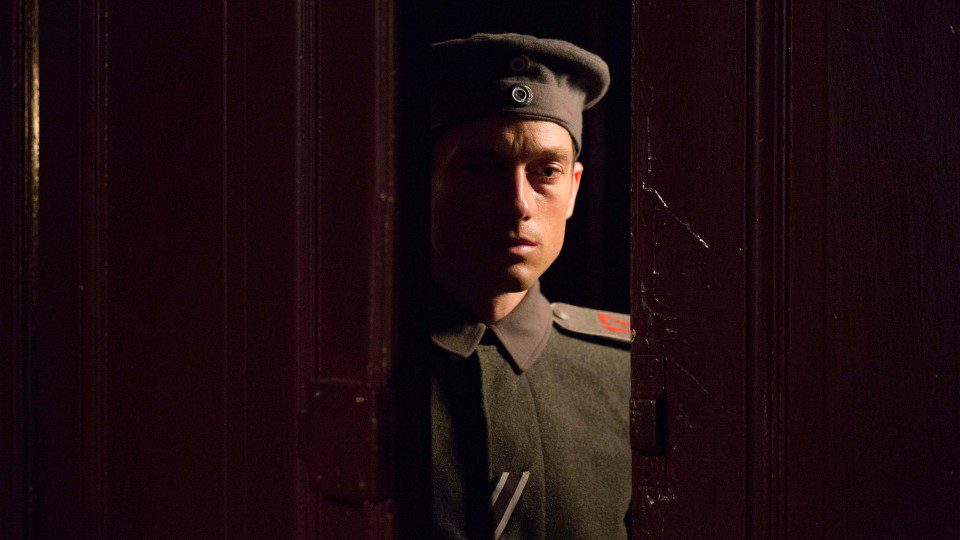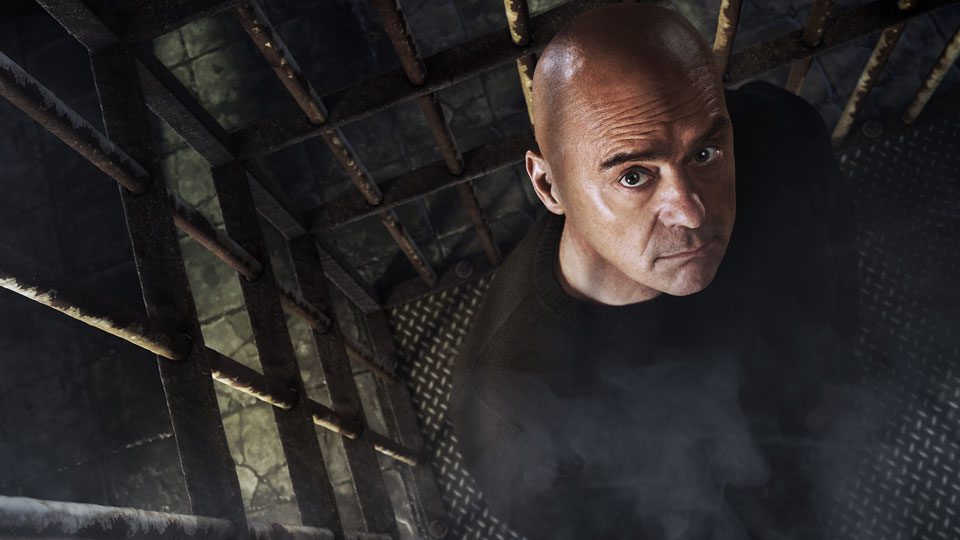Season 2 of critically-acclaimed German crime drama Babylon Berlin is now available in the U.S. and Canada on MHz Choice!
“Revolutions are the locomotives of history.”
“All world-historical events happen twice:
first as tragedy and then as farce.”
– Karl Marx
Season 1 of BABYLON BERLIN set up the cosmopolitan den of iniquity that was the Weimar Republic with Berlin at its epicenter. It touched on political, economic, social, and cultural unrest. Season 1 also introduced us to a multitude of characters who participate in murder, plots and counterplots; espionage, blackmail and corruption using prostitution and drug addiction; political assassinations and demonstrations; and the illegal manufacture and transport of chemical weapons for German rearmament, which was a direct violation of the Treaty of Versailles by the Reichswehr. Meanwhile men and women dance the night away at Efti Moka or at Max Karl Tilke’s cabaret, The Hungry Pegasus. (The real Tilke was a bisexual costume designer, fashion historian, illustrator and ethnographer who opened his cabaret in 1901 with Charles Hornig as MC. See more below about the German cabaret performers of this time period*).
As the story continues to unfold in Season 2, the cast of characters expands and contracts. Different cast members take center stage while moving the various narrative strands forward.
Inspector Rath (Volker Bruch) is appointed by Councilor Benda (Matthias Brandt) to investigate a gangster’s murder and mass executions in the forest as well as to probe the behavior of fellow policemen as a precursor of Internal Affairs.
Mass demonstrations in 1929 Berlin’s working-class neighborhoods (Wedding and Neukoelln) from May 1-3, known as the May Day riots (Blutmai), saw an outbreak of political violence by Germany’s communist party (KPD) marching in defiance of Social Democratic Party (SPD) Police Chief, Karl-Friedrich Zoergiebel’s (Thomas Thieme) ban on public gatherings. The immediate crackdown by the brutal Berlin police using guns and armored cars, provoked street battles and the killings of protesters and innocent bystanders. Despite outcries in the Reichstag as well as in the left and liberal press for 33 dead civilian bystanders and 200 injured protesters, no action was taken against the police. In the series, Rath – an eye witness to the May Day riots – is called to testify but refuses to tell the truth to avoid implicating his colleagues. The International Workers’ Day celebration on May 1st also defied the ban. Their newspaper, Die Rote Front, exhorted workers to march peacefully against the capitalist state. The communist paper, Die Internationale, urged the proletariat to fight against the bourgeoisie. The Nazi newspaper, Der Angriff, viewed the fighting among the SPD and KPD factions as a positive outcome for the nascent Nazi Party.
Councilor Benda has his hands tied by President von Hindenburg (Guenter Lamprecht) who orders the detained train (carrying phosgene) back to Russia to appease Stalin. Russian revolutionaries, unhappy with Stalin and the train’s detainment, plot a counter insurgency. As they race to stop the train, unexpected events take place. Meanwhile, Nobel Peace Prize winners, French Minister Aristide Briand (1862-1932) and German Foreign Minister Gustav Stresemann (1878-1929) enjoy a night out at Max Reinhardt’s ‘Theater am Schiffbauerdamm’ watching “Die Dreigroschenoper” – Bertolt Brecht’s socialist critique of capitalism with music by Kurt Weill. The play is based on John Gay’s 18th Century English ballad opera along with four ballads of Francois Villon. “Die Moritat von Mackie Messer” [Mack the Knife] is a widely performed standard made famous by Hildegard Knef and Bobby Darin. “Seeraeberjenny” [Pirate Jenny] was popularized by Weill’s wife, Lotte Lenya – the foremost interpreter of Brecht/Weill collaborations.
Film and stage in early 20th century Berlin
Demonstrating and rioting by day, Berlin’s population dances nightly on the edge of a volcano, which will erupt in 1933. Until then, the citizens live, love and laugh among the early roots of German cinema.
Early German cinema
Universum-Film AG (UFA, originally Bufa) was created in 1917 as a reaction to Germany’s enemies by using film propaganda as a tool of psychological warfare. German general, politician and military theorist, Erich Ludendorff created (UFA) as a large-scale, state-controlled company serving national interests. Producer/director Joe May’s (1880-1954) May-Film in addition to dominant pre-WW I German film producer Jules Greenbaum’s (1867-1924) Greenbaum-Film and Decla Bioscop experimented with sound films 20 years before “The Jazz Singer” (his son, Mutz Greenbaum became a famous cinematographer) also joined UFA.
From stage to screen
Kurt Gerron (1897-1944) started his stage career in 1920 under Max Reinhardt (1873-1943), the Austrian producer whose avant-garde stage productions made him a famous, innovative, and naturalistic theater/film director. Gerron, a noted film director and actor, worked with Marlene Dietrich in The Blue Angel. He also originated the role of “Tiger” Brown in the 1928 premier of Die Dreigroschenoper, giving the first public performance of “Mack the Knife.” Gerron and his wife, Olga, were murdered in Auschwitz on October 30, 1944. Immediately before their imprisonment and murder, he was coerced into directing the Nazi propaganda film, “Theresienstadt. Ein Dokumentarfilm aus dem juedischen Siedlungsgebiet” (Terezin: A Documentary Film of the Jewish Resettlement) starring Jazz pianist, Martin Roman (1910-96) who survived Auschwitz with guitarist, bandleader Coco Schumann (1924-2018), a member of The Ghetto Swingers who were murdered alongside the Gerrons.
Other popular and well-known cabaret performers who transitioned into silent films include Karl Valentin (1882-1948). Valentin, a silent film actor, clown, playwright, comedian and inspiration for Laurel and Hardy, was also an author and director who influenced Brecht, Beckett, Loriot, and Helge Schneider. Singer, impersonator and silent film star, Gussy Holl (1888-1966) was a Weimar sensation at Berlin’s Schall und Rauch cabaret (founded by Max Reinhardt in 1901). She stars in F.W. Murnau’s 1921 film, Desire. Among her six films are The Sky Monster (1913) and Prostitution (1919).
Cabaret singer and performer, communist party member, and journalist, Jean Ross (1911-73) inspired Christopher Isherwood’s (1904-86) Sally Bowles character in his eponymous 1937 novella and in his novel, The Berlin Stories (1945). The novel inspired John van Druten’s 1951 play, I Am a Camera as well as the hit Broadway musical (1966) and film (1972) Cabaret, a revival of which is currently playing on Broadway.
“Und der Haifisch, der hat Zaehne Und die traegt er im
Gesicht, Und MacHeath, der hat ein Messer, Doch das
Messer sieht man nicht; An ‘nem schoenen blauen
Sonntag Liegt ein toter Mann am Strand Und ein Mensch
geht um die Ecke, Den man Mackie Messer nennt.
. . . . .
Und die einen sind im Dunklen, Und die anderen
Sind im Licht, Doch man sieht nur die im Licht,
Die im Dunklen sieht man nicht.”
(And the shark, he has teeth, And he wears them in
his face, And MacHeath, he has a knife, But the knife
you don’t see. On a beautiful blue Sunday, Lies a dead
man on the Strand, And a man goes around the corner
Whom they call Mack the Knife.
And some are in the darkness, And the others in the
Light, But you only see those in the light, Those in the
Darkness you don’t see.)
“Die Moritat von Mackie Messer,” Die Dreigroschenoper
Text: Bertolt Brecht
Music: Kurt Weill. Premier: August 31, 1928
German film pioneers
Other well-known film pioneers include Erich Pommer, (1889-1966) the German Jewish film producer and executive who became the forerunner of the German Expressionist silent film movement at Decla Film and Decla-Bioscop with films such as Robert Wiene’s (1873-1938) thematically complex Expressionist designed 1920 masterpiece, The Cabinet of Dr. Caligari – one of the most influential silent films in cinema history. Of Jewish descent, Wiene escaped to London then to France where he died of cancer before completing his 1938 French historical drama, Ultimatum (completed by R. Siodmak).
German director Fritz Lang (1890-1976) began his career in 1916 with such landmark German films as the 1922 Dr. Mabuse, the Gambler and The Inferno, Die Niebelungen (1924) and Metropolis (1927). In 1931, he directed Peter Lorre in the critically acclaimed suspense thriller M, which launched Lorre’s international career.
The 1931 international cult film with overt lesbian themes, Madchen in Uniform was directed by Reinhardt trained actress and theater director, Leontine Sagan (1889-1974). Christa Winsloe (1888-1944; novelist, playwright, sculptor) wrote the screenplay based on her German romantic drama, Gestern und Heute. Winsloe and her partner, Swiss author Simone Gentet, offered support and refuge for people fleeing the Nazis. They were shot on June 10, 1944 in the forest after four Frenchmen falsely accused them of being Nazi spies.)
Fritz Kortner (1892-1970), the Austrian Jewish stage/film actor and theater director, worked with Max Reinhardt and Leopold Jessner and was one of Germany’s foremost character actors in Expressionist dramas. Kortner and his actress wife, Johanna Hofer (1896-1988), fled Germany for the US where he worked consistently.
Grete Mosheim (1905-86) was a German film, theater, and television actress who studied with Reinhardt alongside Marlene Dietrich. Her starring role in Dreyer’s 1924 film, Michael is a landmark of silent gay cinema.
Werner Kraus (1884-1959) dominated early 20th Century German theater with his portrayals of demonic characters. His collaboration with Nazi filmmaker Veit Harlan on Jud Suss made him controversial, requiring post-War de-Nazification. He also acted in Waxworks (1924) and in Murnau’s 1926 Tartuffe and The Student of Prague.
Actress and producer, Henny Porten (1890-1960) was Germany’s first major film star and diva. Her father, director Franz Porten, directed her for Oskar Messter’s Messter Film company. She transitioned from silents (Alexandra, 1914) to talkies (Twenty-four Hours in the Life of a Woman, 1931) with a broad range of self-sacrificing characters forced into submission and repression thereby exposing the socio-economic injustices and legal inequalities thrust upon women in all levels of society.
EDITOR’S NOTE: We happily discovered Dr. Pearl Brandwein while reviewing MHz Choice subscriber feedback on our programs and, after reading a half dozen or so of Dr. Brandwein’s insightful reviews, all of us here at MHz Choice had the same thought: We need to get the good doctor to write for us! Enjoy! -MHz Choice
About the author:
A lover of Romance languages and cultures, Dr. Pearl Brandwein has a Certificate in French Culture and Civilization from the Sorbonne. She then earned both her Masters’ degree in French Language/Literature and Ph.D. in Comparative Literature from New York University. Dr. Brandwein’s areas of academic expertise include the Renaissance and the Faust Figure in European Literature in addition to 19th and 20th Century Drama. Her other interests include writing about Holocaust Literature.
Dr. Brandwein began her teaching career at Princeton University followed by faculty positions at other academic institutions. In addition to French, she has also taught German, Latin, English Composition and ESL to corporate executives. After academia, she held numerous positions in the public and private sectors working as an Editor/Instructor/Administrator and as a PR professional and business communications executive directing editorial and marketing initiatives for EU clients.
She is a cineaste and a lover of Film Noir, Westerns and foreign films as well as a theatre and opera buff; she also attends concerts, lectures, ballet performances, museum and gallery exhibitions. In her rare spare time, she reads voraciously.
Want to get MHz Choice Premiere announcements sent to your inbox?
Sign up for our free newsletter here!
MHz Choice is available in the U.S. & Canada. Free 7-day trial then $7.99/mo.
Subscribe at mhzchoice.com.




